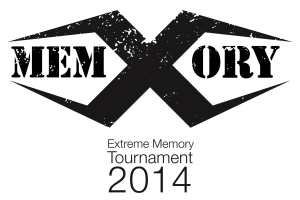 Almost two years ago, I took a trip to St. Louis to participate in a memory study at Washington University in St. Louis (WUSTL). They were doing a battery of memory tests on mental athletes like myself and comparing the results to "regular", un-trained, folks, as well as trivia experts who had also gone through those same tests. At the time, Ben Pridmore and Boris Konrad (two of the best competitors in the world) had participated. I was the third.
It became clear to me that with the Psych Department at WUSTL and their funding source (Dart NeuroScience), there was an opportunity for something new, different, and bigger. In my head, ever since I started competing in memory competitions, I had realized that, in my opinion, it wasn't being done correctly. Memory sports has been around for 20+ years and it still has yet to take off, which is weird considering we live in an age where mental fitness is such a hot topic. In the second half of 2011, I reignited my love for Tennis (a sport I had played a lot in my youth) and got to thinking one day while watching the US Open Finals...why is Tennis so captivating to watch? There isn't much variety in terms of action if you really think about it. Two guys, one ball. A serve, a forehand, a volley, a backhand, a slice, and that's pretty much it. Back and forth it goes, for hours. But that was exactly it, the reason Tennis is so interesting is because it's so simple, easy to understand, and a true battle between two people, who are giving it everything they've got to win.
Almost two years ago, I took a trip to St. Louis to participate in a memory study at Washington University in St. Louis (WUSTL). They were doing a battery of memory tests on mental athletes like myself and comparing the results to "regular", un-trained, folks, as well as trivia experts who had also gone through those same tests. At the time, Ben Pridmore and Boris Konrad (two of the best competitors in the world) had participated. I was the third.
It became clear to me that with the Psych Department at WUSTL and their funding source (Dart NeuroScience), there was an opportunity for something new, different, and bigger. In my head, ever since I started competing in memory competitions, I had realized that, in my opinion, it wasn't being done correctly. Memory sports has been around for 20+ years and it still has yet to take off, which is weird considering we live in an age where mental fitness is such a hot topic. In the second half of 2011, I reignited my love for Tennis (a sport I had played a lot in my youth) and got to thinking one day while watching the US Open Finals...why is Tennis so captivating to watch? There isn't much variety in terms of action if you really think about it. Two guys, one ball. A serve, a forehand, a volley, a backhand, a slice, and that's pretty much it. Back and forth it goes, for hours. But that was exactly it, the reason Tennis is so interesting is because it's so simple, easy to understand, and a true battle between two people, who are giving it everything they've got to win.
From that moment forth, I realized that memory sports was missing that very same set of elements. What memory sports was, at least up until then and well, still now, was an exam - A long, all day (sometimes 3-day) exam. People staring at sheets of paper with loads of information etched onto them for long stretches of time. YAWN. At least the official USA Memory Competition had part of the day on stage in an exciting set of elimination rounds. But it wasn't completely exam-free.
I asked the researchers at WUSTL if they would relay the message to Dart NeuroScience that I was interested in creating an exciting, totally different, memory competition. The response was immediate and positive. We had a few meetings to decide on dates, logistics, budget, and within months I had a blank canvas for a memory competition sitting in front of me.
There were a few things I knew about what this competition would be. For one, it needed to be a tournament, not a competition. It needed to be head-to-head, one match at a time, similar to a tennis match. Second, it needed to have a lot of prize money (a. to lure the best competitors in and b. to increase the stakes and make everything that much more meaningful in competition). Third, I was going to do this right, and to do it right I had to make sure I had the input (and approvals) of the top mental athletes in the world.
After many many months of thinking, tweaking, testing, brainstorming, and stressing, we all (me, WUSTL, Dart, certain top memory competitors) started to see something take shape. I won't go into all the details of this tournament here, but instead, mosey on over to the freshly designed website and learn for yourself: www.extremememorytournament.com.
The competition is a couple months away and is looking to be awesome. Stay tuned for more news and updates as the event date approaches (there is a blog on the tournament website).